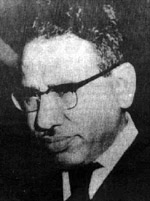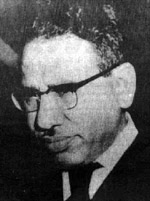
Commemorating the Life of Bakathir [Archives:2001/47/Culture]
November 19 2001
Faruq Al-Kamali
Yemen Times
Taiz

While Bakathir was young he worked in teaching and published “al-Tahthib” magazine. After the death of his beloved wife, Bakathir lived most of his life in Ethiopia and Aden, and then stayed in Hijaz (Saudi Arabia), where he wrote a lyrical social play and composed many religious poems. In 1934 he left Saudi Arabia for Egypt and settled there to study English literature. Bakathir worked as an English teacher for 14 years at al-Rashad in Mansura, Aden.
Bakathir excelled during his stay in Egypt. He wrote his first work challenging his professor at the Department of English Literature in Cairo, as the latter accused the Arabic language of being inflexible. Thereafter, Bakathir translated the famous work of Shakespeare’s “Romeo & Juliet.” Bakathir highlighted the idea of pan-Arabism in his works, particularly emphasizing the Palestinian cause. He embodied this idea in his plays “The Chosen People of God,” ” The New Chylock,” “Secret of the Ruler,” and “Shahrazad’s Secret.” All of the plays written by Bakathir are critical of the situation of Arab states, particularly with regard to the Arab-Israeli conflict.
Similarly, Bakathir wrote historical plays such as ” Wa Islamah” and the “The Red Revolutionist,” which triggered hatred against Bakathir from Communists in Egypt; they wrote many articles criticizing him in Egyptian newspapers. Bakathir loved his hometown Hadramaut very much; thus, he returned there in 1998 and settled there as well. Shortly after settling in Hadramout, Bakathir went back to Cairo and decided to stay there, despite invitations to run newspapers and cultural centers in countries such as Kuwait and Lebanon.
Bakathir is one of the most prominent Arab playwrites of the 20th century. He was awarded many medals, including the State Prize of Egypt for his play “Harot and Marot,” as well as an exclusive medal from the late Jamal Abdulnasir of Egypt in 1967.
Now, 32 years have passed since the death of Bakathir, and a new generation has little knowledge about Bakathir or his literature, except for “Wa Islamah,” which is included in basic education textbooks, while Bakathir’s publications are virtually non-existent in the university curricula. As Bakathir suffered from negligence during his lifetime, his writings also are neglected after his death. Moreover, the death memorial of Bakathir passed away without any notice from the Ministry of Culture, authors or even cultural foundations. Nothing proves our love or respect to this person except the conversion of his house in Hadramaut into an office for the Author Union there. Ultimately, we hope that the concerned authorities will work together to commemorate Bakathir. Would that happen?
——
[archive-e:47-v:2001-y:2001-d:2001-11-19-p:./2001/iss47/culture.htm]


